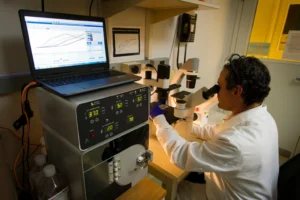
Health screenings play a crucial role in maintaining overall health and preventing diseases. These systematic tests assess an individual’s health status and identify potential health risks, often before any symptoms manifest. This article will delve into the different types of health screeners, their importance, recommendations for screenings, and more, ensuring you have a comprehensive understanding of this essential aspect of healthcare.
What is a Health Screener?
A health screener refers to a variety of tests and assessments designed to detect early signs of health problems or diseases in individuals. These screenings are critical components of preventive healthcare, aiming to identify issues before they develop into more severe conditions. Health screenings can encompass physical exams, blood tests, imaging tests, and questionnaires.
Types of Health Screenings
Health screenings can be broadly categorized into several types based on the conditions they target.
Cancer Screenings
Cancer screenings are among the most recognized health screeners, as early detection significantly improves treatment outcomes. Here are some common cancer screenings:
- Mammograms: Recommended for women starting at age 50 to detect breast cancer early.
- Pap Smear: Essential for women to screen for cervical cancer, usually starting at age 21.
- Colonoscopy: Recommended for both men and women beginning at age 45 to detect colorectal cancer and polyps.
Cardiovascular Health Screenings
Cardiovascular health screenings are vital for detecting conditions such as high blood pressure and elevated cholesterol levels, both of which are risk factors for heart disease. Key tests include:
- Cholesterol Tests: Recommended for individuals with risk factors such as obesity, smoking, or a family history of heart disease.
- Blood Pressure Tests: Routine checks during doctor visits can help identify hypertension early.
Metabolic Disorders
Screenings for metabolic disorders help identify conditions like diabetes. Common screenings include:
- Fasting Blood Glucose Test: Measures blood sugar levels to identify prediabetes or diabetes.
- A1C Test: Provides an average blood sugar level over the past three months.
Bone Health Screenings
Bone health screenings are crucial for older adults, particularly postmenopausal women, who are at a higher risk for osteoporosis. The primary screening method is:
- DEXA Scan: A dual-energy X-ray absorptiometry scan that measures bone density and helps assess fracture risk.
For more interesting blogs, visit our site: https://futuretrendz.co.uk/
Importance of Health Screenings

Health screenings are vital for several reasons:
Early Detection
The most significant advantage of health screenings is early detection. Many diseases, including cancer and diabetes, can develop without noticeable symptoms. Regular screenings can catch these conditions at an earlier stage, improving the chances of successful treatment and recovery. For instance, the five-year survival rate for breast cancer is significantly higher when diagnosed early.
Disease Prevention
Health screenings can identify risk factors that lead to chronic diseases such as heart disease, diabetes, and certain cancers. By recognizing these risks early, individuals can make lifestyle changes, such as improving diet and increasing physical activity, which can significantly reduce their risk.
Informed Decision-Making
Screening results provide individuals with valuable information about their health status. This understanding enables them to make educated choices about their health and overall well-being. For instance, understanding one’s cholesterol levels can motivate dietary changes or increased physical activity.
Peace of Mind
Understanding one’s health status can significantly reduce worries about potential health concerns. Regular health screenings provide reassurance that individuals are taking proactive steps toward maintaining their health.
Recommendations for Health Screenings

Age and Gender Considerations
The specific types and intervals of health screenings are primarily influenced by an individual’s age, gender, and medical history. General recommendations include:
- Women: Commence annual mammograms at age 50, and begin regular Pap smears starting at age 21.
- Men: Begin prostate cancer screenings at age 50, or earlier if there are risk factors.
- Both Genders: Begin regular cholesterol and blood pressure checks at age 40.
Frequency of Screenings
The frequency of screenings may differ depending on personal risk factors. Younger individuals may require screenings every few years, while older adults may need them annually. Specific guidelines are available from various health organizations.
Consultation with Healthcare Providers
It’s essential to have open discussions with healthcare providers regarding individual health risks and screening needs. They can provide personalized recommendations based on health history, family history, and lifestyle factors.
For more interesting blogs, visit our site: https://futuretrendz.co.uk/
FAQs About Health Screeners
What is the primary purpose of health screenings?
The primary purpose of health screenings is to detect potential health issues early, allowing for timely intervention and treatment.
How often should I get screened?
Screening frequency varies based on age, gender, and individual health risks. It is important to discuss your specific needs with your healthcare provider for tailored recommendations.
Are health screenings safe?
Yes, most health screenings are non-invasive and safe. However, there may be risks of false positives or negatives, which can lead to unnecessary anxiety or additional tests.
What should I do if I receive abnormal screening results?
If you receive abnormal results, discuss them with your healthcare provider for further evaluation and guidance on the next steps.
Can lifestyle changes impact screening results?
Yes, adopting healthier lifestyle choices can positively impact screening results, potentially reducing risk factors for chronic diseases.
Conclusion
Health Screeners are a vital part of preventive healthcare that can lead to early detection of diseases, prevention of chronic conditions, and overall better health outcomes. By understanding the types of screenings available and following recommended guidelines, individuals can take proactive steps to maintain their health and well-being. Regular consultations with healthcare professionals and adhering to screening recommendations are essential components of this proactive approach to health management.
Learn more about emerging trends at Future Trendz.







